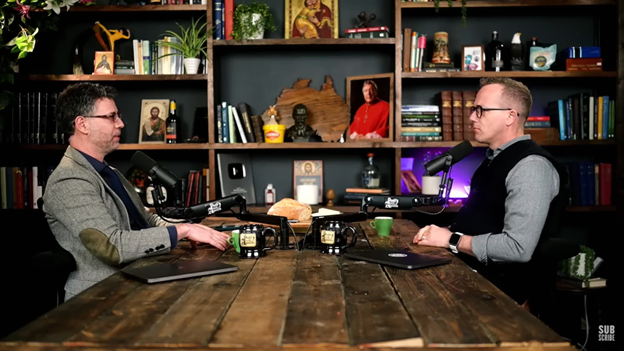The idea of distributism as an alternative to capitalism and socialism has been catching on in certain circles, but a closer look reveals it isn’t really a third system at all.
The political climate continues to perplex. With shifting definitions and trends, it is harder to rely on standard political presumptions like Democrats being anti-war and Republicans only getting support from white middle-class America.
One such presumption for decades has been the Right’s support of free-market capitalism. But that support seems to be waning.
Take, for example, some comments by Tucker Carlson a few years ago. He said, “Market capitalism is not a religion. Any economic system that weakens and destroys families isn’t worth having.” Such a comment, of course, implies that it is at least partly capitalism’s fault that families are crumbling in the United States. Similar anti-capitalist sentiments emerged with the Right’s support of former President Trump’s protectionist agenda, which sought to limit international competition in order to bolster American production—an idea that seems popular with the Republican voting base.
If the Right is drifting away from capitalism, whither is it moving? Are there even any alternatives to capitalism and socialism? Some offer distributism as such an alternative. To be clear, most on the Right are not championing distributism outright or even implicitly. Those who claim the label almost exclusively consist of traditionalist Catholics. That being said, as we’ll see, there are certainly overlaps in policy goals with the broader political Right. As such, it’s worth considering this supposed third way.
What Is Distributism?
There is a Catholic podcast called Pints with Aquinas. To explain it briefly, think of its host, Matt Fradd, as basically Catholic Joe Rogan. The show consists of long-form interviews where Fradd talks to priests, theologians, apologists, and occasionally those known for being politically on the Right (for example, he recently had Jordan Peterson on the show). Accordingly, there have been some guests who have discussed the idea of distributism (most of this article will pull from his interview with Dr. Alex Plato on the topic).
The idea comes from the first half of the last century, and the names most associated with it are Hilaire Belloc and G.K. Chesterton (a direct response to Belloc can be found here). The goal of the system is to have productive property (i.e., the means of production) as widely distributed as possible. This stems from the distributist critique that, under both socialism and capitalism, the means of production end up concentrated in ever fewer hands. Under socialism, it is the state that controls the means of production; under capitalism, it is a small number of capitalists. The goal of distributism is for the means of production to be distributed widely among as many hands as possible.
How Are We Supposed to Get There?
Given the name of the concept and its end goal, many balk at distributism as sounding too socialist. On the surface, the goal seems to be a redistribution of capital, ostensibly to the workers from the owners. Yet this is a third way? Distributists insist, however, that they are not socialists. What, then, are their policy prescriptions? What are the practical ideas to move toward a wider distribution of productive property if not confiscation and redistribution? Joseph Pearce laid out the following policy prescriptions:
Policies that establish a favourable climate for the establishment and subsequent thriving of small businesses; policies that discourage mergers, takeovers, and monopolies; policies that allow for the break-up of monopolies or larger companies into smaller businesses; policies that encourage producers’ cooperatives; policies that privatize nationalized industries; policies that bring real political power closer to the family by decentralizing power from central government to local government, from big government to small government.
These have been the traditional policy goals—a mixed bag, indeed. Part of the problem is how vague they are. What exactly is meant by a favorable climate for small businesses? Does that entail simply removing regulatory state favoritism toward Big Business, or redirecting the favoritism? How strict is monopoly defined, and who is tasked with such a determination? Privatizing national industries and decentralizing governing structures are the best prescriptions, though it could be the case that both are undermined in the attempt to enact the other goals.
Distributism Redefined?
In his interview with Matt Fradd, Dr. Plato attempts to reframe distributism and relabel the idea as localism. For Dr. Plato, distributism is defined by its enemies and its goal. The enemies are threefold:
- Big business
- The modern state
- Technopoly
(Plato describes technopoly as scientism plus technology, where the goal is to make the world what “we” want it to be, regardless of reality. Put another way, this enemy is the desire to control via technology.)
These enemies sit between us and the distributist goal: healthy families, that is, families that have some level of independent economic freedom because they own some capital.
The new definition is an attempt to sidestep the traditional policy prescriptions, which Plato insists are not essential to being a distributist. To be a distributist, you need not support “anti-competition” or antitrust legislation; you need only oppose the enemies listed. In fact, unless you prove yourself otherwise, Plato assumes you already are a distributist. Distributism is the starting point, and you only defect to socialism or capitalism, it seems.
Ask any free marketeer or libertarian, and you will find a similar list of enemies (though the last one may be debated). To be clear, by “big business,” Plato means those megacorporations that seek and obtain rents from the state. Combining the first two enemies, Plato is basically saying that to reject crony capitalism is to be a distributist. This is a clear break with the tradition of the idea, and a move that is unfounded, to say the least.
This becomes even more apparent when considering Plato’s practical suggestions. His prescriptions consist of eliminating tax differences between capital and labor, privately investing in local communities, and engaging in barter with your neighbors when possible. Nothing about these recommendations describes a novel economic system.
What Are We Left With?
In simplest terms, the economy is the nexus of individuals’ attempts to economize regarding scarce resources in a society to satisfy their most pressing needs first, moving down the list in order of importance. The things being economized are capital goods—“productive property,” in the words of distributists. The defining characteristic of an economic system is who owns the means of production. The traditional definitions are:
- Socialism: State ownership of the means of production.
- Communism: Communal ownership of the means of production.
- Capitalism: Private ownership of the means of production.
Where does distributism fit into this picture? It depends upon its relationship to the state, regardless of whether we use its traditional definition or Plato’s new framing. The goal is widespread ownership of the means of production. If the way to bring about this is simply intellectual conversion, then we have not left the realm of capitalism. Without state enforcement, distributism amounts to nothing more than a specific ownership structure by private individuals. The decision between, say, a limited liability company and a cooperative is not a decision between economic systems.
Moreover, encouraging people to invest more in their local economy consists of nothing more than trying to change people’s subjective preferences. This is not a challenge to the capitalist system, but the capitalist system itself at work. Proposing a different business organization and set of subjective preferences is not proposing a new economic system.
What if there is state enforcement, say, regarding company size, structural organization, etc.? Depending upon the extent of the regulatory state, we end up in one of two camps. The first would be an interventionist state layered on top of our capitalist system, which is not a third way (and in fact what we currently experience in the United States). The second would be, if the interventions become so large that the state is the primary driver of economic decisions, that we would enter the realm of economic fascism, which is simply de facto socialism. In fact, as Ludwig von Mises noted, an interventionist regime “cannot be considered as an economic system destined to stay. It is a method for the transformation of capitalism into socialism by a series of successive steps… It is a method for the realization of socialism by installments.”
Conclusion
It should be apparent now that distributism in no way offers a third option, an alternative to capitalism and socialism, with or without Dr. Plato’s rebranding of the concept. Distributism is either a voluntary social arrangement within capitalism, or a regulatory apparatus that suffers from the critiques leveled against interventionism and socialism in general. We are once again left with the options of capitalism and socialism.
If distributists wish to discuss the preferability of worker cooperatives, they are welcome to do so. But they shouldn’t pretend they have a new, radical economic system to propose. You’re either a capitalist or a socialist—the former being quotidian and the latter tired and untenable.

